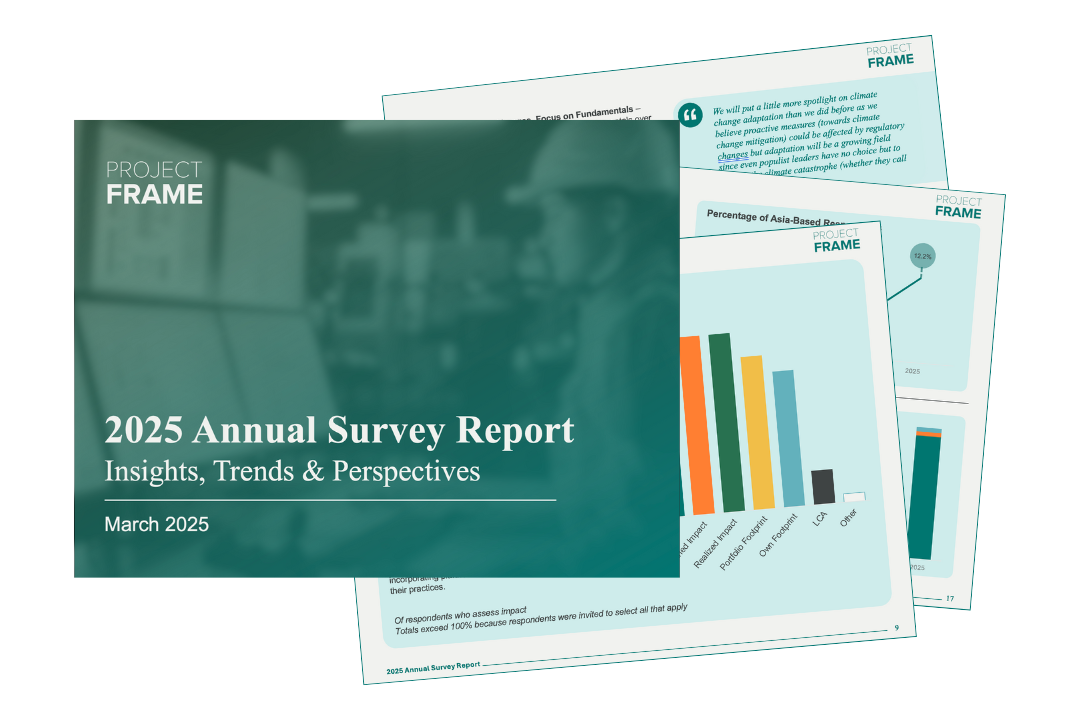Project Frame 2025 Annual Survey Report
Project Frame’s (Frame) previous Annual Survey began with a simple statement: 2023 was the planet’s hottest year recorded.
Unfortunately, that no longer holds true, as 2024 was confirmed to be the hottest year in recorded history. Scientific consensus asserts that greenhouse gas emissions from human activity have accelerated global warming, leading to more frequent extreme weather events, rising sea levels, and disruptions to natural ecosystems. The urgency for meaningful climate action has never been greater. While many governments have pledged to reduce emissions and transition to clean energy, political headwinds present significant challenges.
In this context, the private sector has an unprecedented opportunity to transform the market to address climate change by accelerating innovation and ensuring meaningful accountability in climate investments. The transition to low-carbon has the potential to contribute approximately $275 trillion to global GDP between 2021 and 2050, while simultaneously averting $38 trillion per year in climate change-related damages by 2050.
Beyond the economic benefits of climate action, a sustainable planet supports strong national security and geopolitical stability. At a 2021 climate conference, the United States’ Defense Secretary Lloyd Austin said, “No nation can find lasting security without addressing the climate crisis.” The United Nations Environment Programme highlighted the intricate linkages between climate change and security risks, warning that droughts and extreme weather events lead to food and water shortages, increasing global conflicts due to resource scarcity. Conflict-affected regions are particularly vulnerable, as instability hampers effective climate adaptation efforts, leaving communities more susceptible to compounded crises.
Private sector action to mitigate further crises must be accompanied by rigorous accountability and transparency measures. The growing risk of greenwashing—misleading claims about environmental impact—threatens to undermine real progress. Without proper oversight, capital intended for climate solutions can be wasted on projects that do little to reduce emissions or enhance sustainability.
To counteract misuse, stakeholders must demand greater transparency from investors and companies. Community-driven reporting frameworks, such as Project Frame’s most recent Methodology for Evaluating Greenhouse Gas Impact for Early-Stage Investments, help ensure that early-stage climate investments are held to measurable and verifiable commitments. Climate finance must be directed toward solutions that demonstrate the opportunity for measurable emissions reductions.
Project Frame’s Annual Survey captures the state of climate Impact Measurement & Management amongst our growing community. In our third iteration of the survey, trends are beginning to crystallize alongside new insights into the opportunities and challenges related to climate investing in 2025 and beyond.
Key Takeaways
Use of forward-looking GHG impact methodologies is on the rise. Most (96.7%) respondents indicated they follow a methodology, a roughly 20% increase over previous years, the majority (80.6%) of which follow Project Frame’s methodology
Three years running, concern for the planet remains the top motivator for GHG impact assessment. Tied at second place are “pressure from LPs” and “financial interest.” Frame sees these as unique leverage points to advance the adoption of best practices.
High Demand for more Case Studies We are pleased to learn that our library of Case Studies has been a valuable resource and that the Project Frame community is calling for more. Fortunately, 28 respondents have indicated interest in supporting new Case Studies inspired by their own climate investments!
Most organizations and investors plan to stay committed to their existing strategies despite political shifts creating potential uncertainty in 2025, with some adjustments based on regional policies and regulatory trends.
Project Frame Milestones
As of March 2025, the Frame community has reached 1,300 participants representing over 700 organizations, of which 400 are investment firms.
In the three years since Project Frame’s inaugural Annual Survey, significant progress has been made in support of Frame’s mission. Most notably, Frame has published two iterations of its emissions impact assessment methodology: Pre-Investment Considerations (2023) and Project Frame Methodology: Evaluating Greenhouse Gas Impact for Early-Stage Investments (2024).
Frame’s guidance—the product of its five Working Groups over three years—is supported by a suite of Case Studies, inspired by real investments demonstrating the methodology in action, and a GHG Impact Resource Dashboard, a community-sourced collection of tools and service providers that support emissions impact assessment.
Frame’s community building is furthered through Investor Snapshots. Introduced in 2024, Snapshots provide investors with another opportunity to lift the veil on how they integrate impact into their investment process, encouraging transparency and knowledge-sharing. These conversations are continued at Frame’s bi-monthly Community Meetings. During the 15 sessions hosted to date, Frame members have been invited to share best practices and learn from experts on topics that pertain to climate investing, including tipping points, changing political landscapes, emerging technologies such as AI, and more.
This year, Frame is honored to have its work recognized by influential organizations, including the World Business Council on Sustainable Development (WBCSD), Ceres, GFANZ, and the Global Impact Investing Network (GIIN). We are equally encouraged to see the methodology used to promote informed investment decision-making, such as by the Japanese Ministry of Environment and the updated free and open-access CRANE tool.
Insights Overview
Strong regulatory frameworks remain critical to combatting climate change
Most intend to stay the course amid political uncertainty
Scaling climate ventures in 2025 face a mix of challenges and opportunities
Varying levels of community stakeholder engagement among climate investors
“While we do not directly engage with communities, we do believe stakeholder voice is critically important and we do consider--and systematically discuss with our portfolio companies--the social, economic, and environmental impacts of their work and any potential unintended consequences for the communities they serve, alongside their intended climate impact.”
2025 Annual Survey Respondent
Three Year Trends Overview





Use of forward-looking GHG impact methodologies is on the rise.
Concern for the planet remains the top motivator for GHG impact assessment, while pressure from LPs and financial interest is on the rise.
Increase in Asia-Based Project Frame Engagement
A slight shift in return expectations among investors
Impact assessment is consistently led in-house

